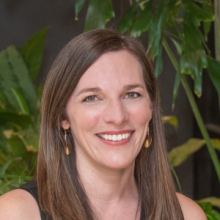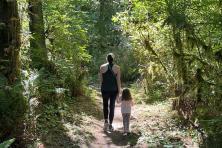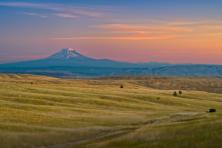In 2030…
… the baby that is kicking in my belly – almost ready to start her life in Oregon – will be an 11 year old playing soccer and begging to have slumber parties with her middle school friends.
… my snuggly, light-hearted toddler who is proudly pointing to the new things he discovers every day, will be navigating that awkward, exciting space between middle school and high school.
… and we adults will have chosen what kind of climate future these kids will inherit.
The recent report by the UN’s Intergovernmental Panel on Climate Change (IPCC) warns us in no uncertain terms that we only have until 2030 to drastically change the trajectory of how much climate pollution is dumped in the atmosphere before locking in the dystopian reality of a hot, unstable climate that we can’t reverse. The IPCC report is a stark reminder that we are facing a climate crisis, and need to step up NOW.
Two things you can do right now to act on climate in Oregon:
Be a Climate Voter! Vote by November 6 to support ballot initiatives that are good for the climate and frontline communities.
- Yes on the Portland Clean Energy Initiative (26-201)
- No on Measures 103, 104 and 105
Support the Clean Energy Jobs bill! It puts a mandatory limit on our state’s climate pollution and invests in clean energy solutions across Oregon.
The science is unequivocal: Together we must reduce our climate pollution by 45% by 2030 to limit global warming to 1.5°C. Every additional ton of carbon dioxide, methane, and other greenhouse gases that we burn and dump in the air in these next 11 years will exacerbate the heat-trapping, climate-altering nature of our atmosphere, locking in a worse reality for the next generation.
The silver lining in the IPCC report is that we can still avoid a climate disaster, and we have most of the tools we need to do that. It requires us to double down on urgency and get to work. We can do it – but we don’t have years more to wring our hands and pretend there is any other course that leaves our kids a livable and sustainable Oregon.
We have to move away from fossil fuels as fast as possible and power our economy, homes and cities with renewable resources like solar, wind, and energy efficiency. We have to transition off of gasoline and diesel, and run our transportation system with electricity, low carbon fuels and more non-car alternatives. We need our forests and natural lands to soak up as much carbon dioxide as possible. And, as the IPCC report calls for, we should adopt a strong price on carbon to accelerate the transition to cleaner ways of manufacturing and powering our economy.
If we don’t change course now, the climate crisis will intensify the deadly and damaging impacts already being felt by those on the frontlines – whether that’s the community living along a freeway in East Portland with few trees and fewer sidewalks, the family in Southern Oregon stuck indoors this summer as weeks of smoky, unbreathable air turned into months, or the millions in countries like India struggling to survive record heat waves, crop die-offs and deadly typhoons.
It’s on us in Oregon and every other state to step up and take back the wheel from the fossil fuel companies and their enablers in the federal government driving us over the climate cliff. Accelerating toward a low-carbon future powered by clean energy will be more sustainable, equitable and livable for the next generation of Oregonians.
We are the adults in the room making this choice for our kids right now. We are the stewards trusted with caring for our beloved state during this consequential decade, responsible for passing it on to the next generation in better – not worse and irreparable – condition compared to how we inherited it. In 2030, I look forward to being able to focus on the more mundane chaos of parenting teenagers instead of worsening climate chaos.





